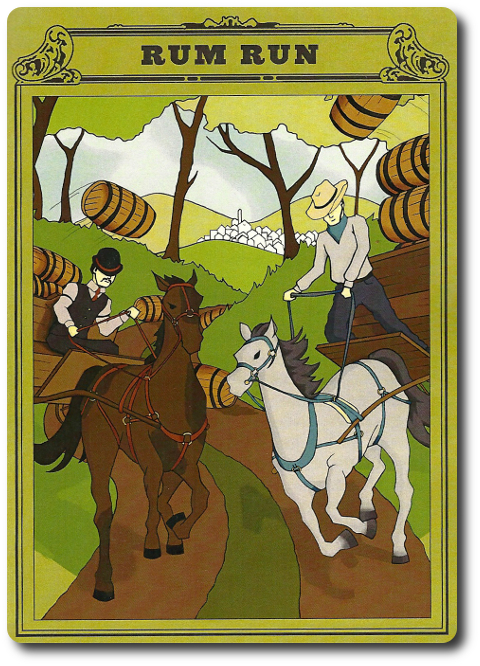
The Basics:
- For ages 7 and up (publisher suggests 12+)
- For 2 to 4 players
- Approximately 90 minutes to complete
Geek Skills:
- Counting & Math
- Logical & Critical Decision Making
- Reading
- Pattern/Color Matching
- Strategy & Tactics
- Visuospatial Skills
- Cooperative & Team Play
- Hand/Resource Management
Learning Curve:
- Child – Easy
- Adult – Easy
Theme & Narrative:
- Race to be the first to rescue a small town from their painful sobriety
Endorsements:
- Gamer Geek approved!
- Parent Geek mixed!
- Child Geek approved!
Overview
In 1920, it became illegal to order a beer or any alcoholic beverage. Both politicians and church leaders saw Prohibition as a means to get the United States firmly back on the moral track it had jumped from. In contrast, criminals and law-abiding citizens saw Prohibition as a wonderful business opportunity. Men who always lived on the right side of the law now made illegal whiskey in their homes and honest day laborers transported barrels of alcohol under the protective cover of night.
Rum Run, a self-published game designed by Alex Coulombe via the Game Crafter, is comprised of 1 game board, 112 Road tokens (in 4 different colors, 28 tokens per players), 25 wooden miniature barrels, 1 Town Center token, 1 Pawn, 12 Distillery cards, 15 Fog tokens, 10 Objective cards, 20 Event cards, and 6 double-sided Obstacle cards. The game board is firmly mounted on thick cardboard and very durable. All tokens are thick plastic chips. Note that stickers will need to be applied to each of the tokens. The cards are as thick as your standard playing card.
It’s worth mentioning that the game’s theme and narrative is set during the Prohibition period (1920 to 1933) in the United States when alcohol was illegal. The players are, technically, breaking the law in the game. Not that the Prohibition law was an overly popular one, but breaking the law is still breaking the law. This might not be a game parents will want to play with their children as a result. However, the game’s theme and narrative do not loudly proclaim the benefits of lawbreaking or illegal alcohol consumption. As such, players never really need to concern themselves with alcohol on any level. Terms like “distillery” are used, as are a few names of alcohol, but nothing is mentioned in the way of debauchery, alcoholism, or alcohol related violence. As such, simply switching “rum” for “root beer” does the trick nicely and you suddenly have a game that is no longer morally ambiguous. Not that it was in the first place, mind you.
Note: We were sent the deluxe version of the game that contained higher quality components. Two other versions of the game exist that are considerably cheaper, but not as nice looking. If the game sounds interesting to you, but is out of budget, take a look at Rum Run Basic Edition and Rum Run Paper Edition.
Setting Up Your Still
Note: Rum Run was designed to be flexible so as to maximize replay value. Just about everything in the game is a variable that can be added or removed from the equation. This allows players to tailor the game to their group preferences. As a result, there is no single way to set up the game. A “Quick-Start Guide” is provided that sets up the game for new players and does a good job of getting the game started. We will be discussing how to set up the game in general and encourage you to read the game’s rules for additional details.
To set up the game, first place the game board in the middle of the playing area.
Second, place the Town Center token and Pawn on any grid intersection on the game board. A grid intersection is defined as the crossing point of 2 lines.
Third, give each player 28 Road tokens of the same color. Players are welcome to organize their Road tokens in front of them however they like. Players can optionally hide their Road tokens during play, too, if they really want to. I highly suggest you use the “Forest Folk” tokens, which give the players a “wild” value. This makes for some very interesting roads and plays.
Fourth, shuffle the Distillery cards and place as many or as few as the group likes on the game board, making sure to match the Distillery card borders with the grids on the game board. I suggest you use no more than 4 Distillery cards and flip them face-down so their values are unknown at the start of the game. Or don’t. It’s really just a matter of preference. Leaving them a mystery makes for some interesting surprises later on, but knowing all about the Distillery card will help new players make choices. If you like, reveal some and make a few a mystery. Any Distillery cards not used are returned to the game box.
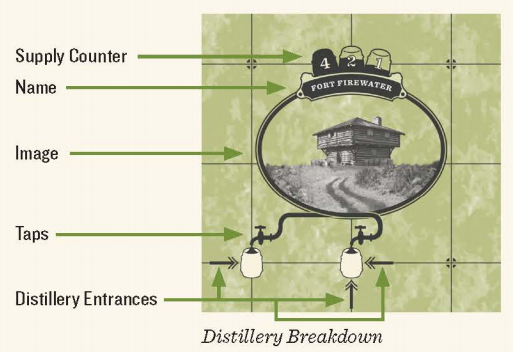
Fifth, grab the Obstacle cards and place as many or as few as the group likes on the game board. Note that the cards are double-sided and some obstacles use more than 1 card. Obstacles are roadblocks and force players to go different directions. Using the Obstacle cards makes for a more difficult game since they force a player to make long routes around them when building roads. Think of Obstacles cards as “terrain”, if you like. A few Obstacles cards are good, but don’t get carried away. Any Obstacles cards not used are returned to the game box.
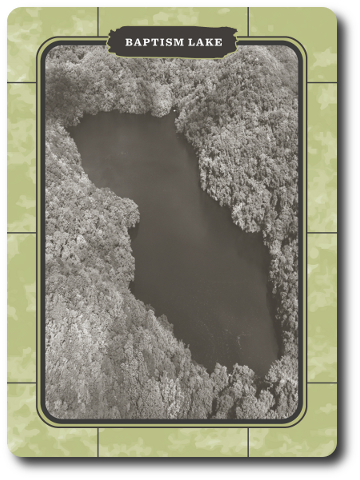
Sixth, select any Fog tokens the group would like to use and place them face-down on the table. Mix the tokens and then place them, face-down, on any grid intersections. Fog tokens might or might not be good for the player when they are revealed. I like using them. Give them a try, but do an even mix of positive and negative Fog tokens to make things fair. I think it adds a fun level of exploration and discovery, personally, and will tempt players to go “off the beaten path” or make a hasty detour. Any Fog tokens not used are returned to the game box.
Seventh, select any Event cards the group would like to use, shuffle them, and place the deck of Event cards to be used face-down next to the game board. Events are triggered when a player taps a Distillery card. They are always random and really don’t do much other than throw players the occasional curveball. I tend to leave them out when playing with new players, but it’s once again a personal choice. Any Event cards not used are returned to the game box.
Eighth, select any Objectives the group would like to use and set them, face-up, next to the game board. Do play with the Objective cards, as they add direction and new goals for players not familiar with the game. If you are familiar with Settlers of Catan or Ticket to Ride, there are specific achievements that can be earned if the player is the first to accomplish a game goal or builds something. “Longest Route” or “Longest Road”, for example. Any Objective cards not used are returned to the game box.
Ninth, place the barrels to one side of the game board and within easy reach of at least 1 player. Or, if you revealed the Distillery cards, place a number of Barrels on each card equal to the total sum of the Distillery card’s supply counter.
Tenth, each player selects 1 Road token secretly and then reveals it. The player with the highest sum of all the “pips” (the dots) goes first and places their Road token on intersection lines with one number touching the Town Center token. The next players, in order of next highest sum to lowest sum, do the same. The player with the highest sum is the First Player and turn order sequence is clockwise.
That’s it for game set up. I have no idea how you set up your game, by the way, which is part of the fun. Let’s make some hooch!
Rumming and Running
Rum Run is played in turns with no set number of turns per game. On a player’s turn, they will complete one of two possible actions (not both). The actions are summarized here and by “summarized” I mean “watered down”. The rule book does an outstanding job of explaining everything and teaching the players with words and images. I just want to give you the basics of the game and what to expect, as I dislike reinventing the wheel.
Optional Action 1: Build a Road
To begin with, all roads must begin at the Town Center, which was already established when turn order sequence was determined during game set up. Players in the game are not making alcohol; they are only transporting it. Thematically speaking, each “pip” on the Road token is meant to represent 1 hired muscle to help maintain the safety of the road and watch out for the Law. The goal is to build a safe road from the Town Center to the Distillery card’s taps. This allows the players to grab the barrels and transport them back to the Town Center.
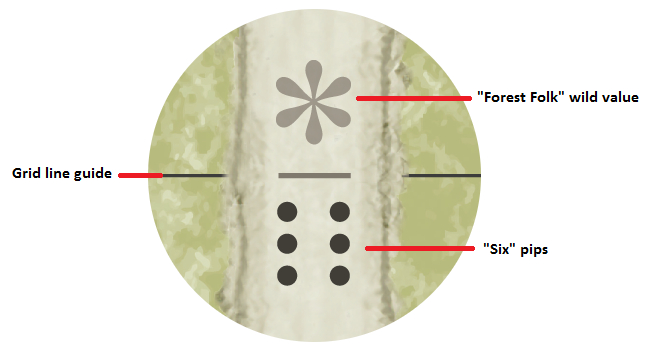
But, it’s not that simple. Or, rather, it is, but there’s just a bit more to it.
When placing Road tokens, the values that are “connecting” one Road token to the next must be the same value. For example, if one side of the Road token is a “3” the Road token that connects to it at that point must also be a “3”. The one exception is the “Forest Folk” which is a wild value and can be connected with anything. If a player places a “double” (the number values are the same on both sides of the Road token), the player can place another Road token immediately.
To turn directions, players must place a “double” token and orientate it correctly on the grid. The players can now build off either end of the newly placed “double” Road token. Each Road token has a line on it that separates the number values. This is used as a guide when placing the Road token on the intersecting grid lines.
There is also the concept of a “loose road” that allows players to tak previously played Road tokens and reutilize them. This is particularly important when a player has played Road tokens to a now fully tapped out Distillery that no longer provides barrels. A “loose road” is defined as any Road token that has 1 or zero connections to other Road tokens. Or, if you like, the last token in the line. If a player has access to such a token, they can move it to another road, put it back in their inventory as their Road building action, or even swap it out with another Road token in their inventory (as long as the number values allow it).
Finally, players can also “break roads” by replacing an opponent’s Road token with a Road token that has higher total sum of “pips” than the opponent’s Road token. If the player can, their Road token is placed where the opponent’s was (the opponent takes the Road token back into their inventory) and that section of the road now belongs to the player. Road token placement rules still apply.
Optional Action 2: Move the Rum
After a player connects the Town Center to a Distillery card that has 1 or more barrels, the player can start hauling the goods (referred to as “caravanning”). This is referred to as “tapping” and it allows the player to start moving the barrels back to town. A player must connect their Road token to the Distillery card entrance (indicated by an arrow and image of a barrel being filled by a faucet).
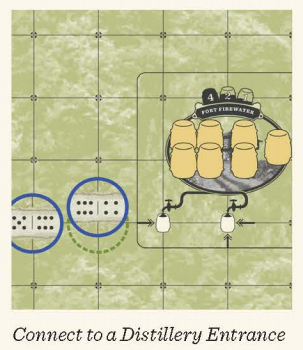
The first tapping will have the most barrels, followed by the second tapping, and finally the third and least profitable tapping. All the barrels associated with the current tapping are moved to the player’s connecting Road token. From there they are moved down the player’s Road tokens to the Town Center using the following rules:
- All the barrels on a Road token must move at the same time.
- A barrel must be left on each Road token the player moves through
- All barrel movement must go towards the Town Center
When moving barrels, the player can only move those on their Road tokens. If a barrel is ever placed on an opponent’s Road token, the player loses control of it. The best example of this happening is when a player has more barrels than spaces left to the Town Center. Extra barrels must be deposited beyond the Town Center on whatever Road tokens the player likes. Oftentimes, these are Road tokens that belong to opponents.
Scoring Points
When transferring barrels, the player wins 1 point per barrel delivered to the Town Center. Only 1 barrel can be scored per movement of barrels. As already explained, extra barrels that still remain after arriving at the Town Center are placed in other Road tokens. Unscored barrels belong to whatever player owns the Road token they are one and can be moved for scoring as one of the two possible actions. Scored barrels are removed from the game board and placed in front of the player.
Triggering Events, Clearing the Fog, and Completing Objectives
Event cards are drawn whenever a Distillery is tapped. The Event card is drawn and read out loud by the player who just tapped the Distillery card. If the Event card can be resolved, whatever action is described is done and the Event card is discarded. If the Event card cannot be resolved, it’s discarded and another Event card is drawn.
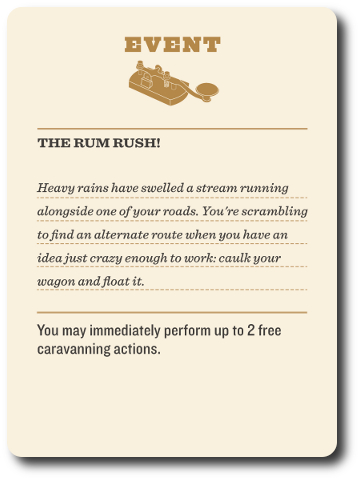
The Fog tokens are revealed when a player places a Road token on them. Before the player’s Road token is placed, the Fog token is revealed and resolved. If the Fog token remains on the game board, is stays in its current location. If it’s removed, it’s discarded for the duration of the game. Some examples of Fog tokens include:
- Bonus barrels of booze that someone just left on the side of the road
- Unmovable road intersections
- Lose a turn
All of the Objective cards are visible at the very beginning of the game. If a player meets the requirements for any of the Objectives at anytime, they can claim the Objective card. Some Objective cards are claimed once and can never be lost. Other Objective cards can be won and lost multiple times, being dependent on current game conditions and leading scores or road builds.
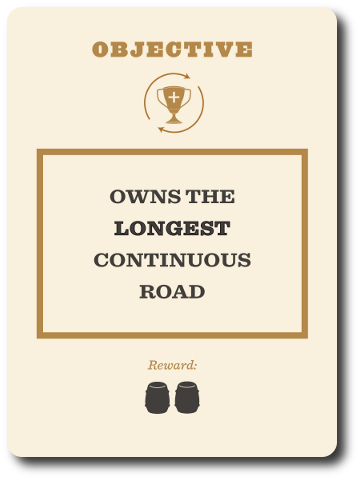
Winning the Game
The game ends when a specific number of barrels are collected (including those provided by Objective cards). The number of barrels necessary to win is based on the number of players. For example, a 3-player game can be won by the first player to collect 7 barrels.
Game Variants
Fog, Objectives, Events, Obstacles and Forest Folk
As previously mentioned, the Fog tokens, Objective cards, Event cards, Obstacle cards, and Forest Folk tokens are all optional. You can use them or not with the basic game. I suggest you do, but go easy on how much you add. Start small and add more as needed.
Puzzles
There are three puzzles described in the rule book that are designed to get the player thinking about how best to place Road tokens. The player selects a 6 specific Road tokens and then attempts to connect locations. While not overly difficult, they do a good job of quickly impressing upon the player the importance of Road token management and the power of planning ahead.
Distillery Crossroads
If a player is connected to a Distillery card, they can transfer barrels through the Distillery card as if it was a Road token. However, any barrels moved through the Distillery card can be tapped by an opponent if they happen to be connected to the distillery, too.
Two-Player Variant
Instead of giving each player tokens of a single color, each player gets 2 colors. This doubles each player’s total number of Road tokens. When using this variant, remove the “Forest Folk” Road tokens from play.
Team-Play Variant
When playing with 4-players, divide into teams of 2. Victory is shared, but players cannot share barrels or roads. This opens up new opportunities to teach new players the game and try new defensive strategies that block opponents while allowing a team member free access to a fully loaded distillery.
To learn more about Rum Run Deluxe Edition, visit the game’s web page on the Game Crafter.
Prediction
Rum Run has been described as Dominoes meets Mancala. This is an accurate assessment from what I have gathered just by reading the game rules. The road building portion of the game is taken directly from Dominoes and the movement of the barrels is a direct lift from Mancala. But this game is so much more than two games mashed together. You can break roads, intercept barrels, trigger random events, and must work around obstacles. Players have to think a lot in this game since their Road token are limited. They can be pulled back, but only if they are dangling at the end of Road token chains. Given all this, I think Rum Run will do very well with the Gamer Geek crowd due to the level of strategy and tactics a player must utilize to be competitive against other game elitists. There is no luck in this game, and what randomness there is (Event cards) can be removed if required.
For the Parent Geeks, the only hurdle I see is the game’s theme. Running liquor in the 1920’s is not what I would consider immoral, but some parents might not like the game’s theme enough to avoid it altogether. Sex, violence, drugs, and liquor are never well received by the Parent Geek crowd with very few exceptions. I predict a mixed level of approval from the Parent Geeks, with some parents not really seeing the game’s theme as an issues and others not being able to get past the fact that they are teaching a game to their children that is all about running illegal hooch.
For the Child Geeks who are allowed to play Rum Run, I think they are going to have a great time. This game can easily be modified to fit the current skill levels of the players without dumbing the game down, which means that the game should be able to be played with Child Geeks much younger than the game’s minimum age suggests. Plus, the game’s 2 core mechanics are already well-known to the majority of the Child Geeks who will be playing this game.
Teaching Rum Run is best done by first explaining road building and then barrel movement. They are two very separate actions in the game, but are dependent on each other. You cannot run the barrels unless you have a road, and there is no reason to build the road unless there is a distillery with barrels. Bridging the gap between these two actions should be very simple, but provide a brief demonstration of breaking roads and moving barrels should also be part of your game explanation. Note that Child Geeks who cannot read can technically play Rum Run if the Objective and Event cards are read for them. At the very last, a player must be able to do simple math and match numbers in order to play this game.
And so, after teaching the game to my 2 oldest Child Geeks, I asked them their thoughts on Rum Run so far.
“It’s Dominoes meets Mancala on a game board. Pretty cool.” ~ Liam (age 10)
“Easy math, but lots of tokens. I think I’m going to get lost.” ~ Nyhus (age 7)
There are a lot of tokens and I was also a bit intimated at first when I saw the number of Road tokens I had to use. Believe me when I say that players will very quickly wish they had MORE Road tokens then they originally receive. Let’s play Rum Run and see if it wets our whistle or leaves us feeling dizzy.
Final Word
Most of our Child Geeks have already played Dominoes and Mancala. As these two games are the base on which Rum Run is built, the Child Geeks had no problem learning and being competitive. The only aspect of the game that was difficult for the Child Geeks to grasp at first was the Objective cards. As in, they didn’t do much with them. Objectives are extra points, but not necessarily goals. I would have thought the Objective cards would be something like the proverbial carrot on the string, but the Child Geek ignored them at first. When it became obvious how hotly contested the barrels were at the distilleries, the Objective card became very popular. According to one Child Geek, “I really like this game because it’s easy to understand and fun to play. Especially when building the roads and moving the barrels.” Another Child Geek said, “I like it when I can break another player’s road!” This Child Geek makes a good and surprising point. There is a certain element of combat – although that’s not the right word for it – within the game that allows players to engage opponents on a much more aggressive level than originally thought. Neat stuff. The game’s length was also found to be a bit too long for some of our Child Geeks. Luckily, Rum Run is a game you can easily just “pause” and pick back up after a break. You can also reduce the total number of barrels needed to reduce the game’s length. When all the games were over, the Child Geeks voted to approve Rum Run.
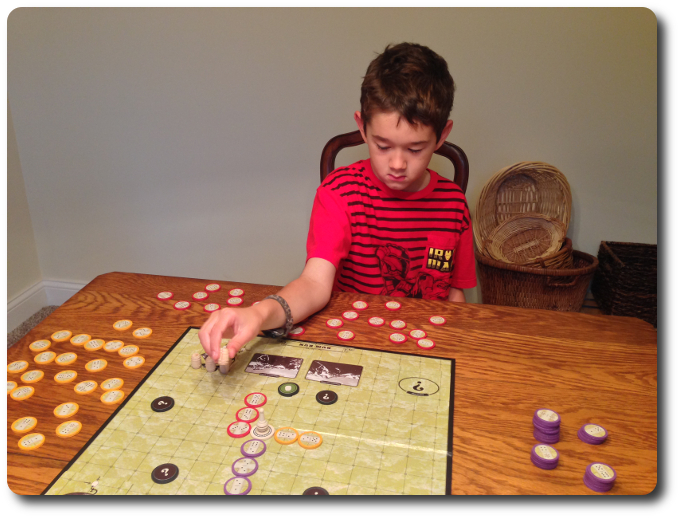
My oldest little geek places a newly discovered barrel on his road – IT WILL BE MINE!!!!
The Parent Geek were mixed about approving Rum Run, but the decision was split on grounds of what I would like to call “parenting comfort”, not on the game itself. All the Parent Geeks agreed that the game was a good one. Heck, even “great”. What kept it from getting the full approval of the Parent Geeks was the game’s theme. According to one Parent Geek, “I really like this game, but it’s not one I would want to play with my kids. Illegally running alcohol to help a town get drunk is not what I would call a quality family game.” Another Parent Geek said, “Great game, great mechanics, and a lot of fun, but not a game I would want to play with my kids. With with adults? You bet! Especially if a brew or two was on the table, too.” For those Parent Geeks who didn’t have a problem with the game’s theme, they found Rum Run to be an excellent mix of strategy and tactics that was light enough for their family table and casual enough for all the players in their family. According to one Parent Geek, “I really like the game and the way you build roads and deliver the barrels. I have no problem with the game’s theme.” Another Parent Geek said, “I love how many ways you can set up the game and tailor it. Endless replay value and an excellent game to boot!” When all the games were over and the last beer glass cleaned, the Parent Geeks gave Rum Run a mixed level of approval.
The Gamer Geeks were a bit skeptical when it came to Rum Run. When I told them the game was a mashup of Dominos and Mancala (two games not overly enjoyed by the gamer elitists), I’m sure their original thoughts were not positive. What they found was a strategic and tactical abstract game with some real depth to it. So, yes, they liked it. According to one Gamer Geek, “I’m surprised how much I am enjoying this game. I think it’s abstract design might not appeal to some players, but this is a really nice game.” Another Gamer Geek said, “Some really interesting things going on here. You have to manage you tokens, manage your barrels, and race your opponents. I like this.” One aspect of the game the Gamer Geeks didn’t care for was the Event cards. According to one Gamer Geek, “I don’t care for random events creeping into the game and forcing players to play differently. It’s not necessary or needed.” Good thing the Event cards are optional! Which might explain why all the Gamer Geeks voted to approve Rum Run.
I really, really like this game and it pains me that I cannot award Rum Run the Father Geek Seal of Approval. Alas, the theme of illegal alcohol running caused enough Parent Geeks to squirm when it came time to vote. Does that make Rum Run a bad game or an unfriendly game for families? Certainly not, but you can’t help but ask why alcohol was used in a game that is easily played by Child Geeks. Couldn’t this game be made using a futuristic space theme, where the players are mining elements on distant asteroids and using space lanes to ship them back to the home planet? Oh, sure, but let’s not focus on the theme too much. A game’s theme and narrative is the bread on which the sandwich is served. It’s part of the delivery, but not the main ingredient. Nevertheless, it’s perfectly fine for a person to dislike a game because of the underlining narrative or its thematic elements. For examples, it’ll be a cold day in Hell before I sit down to play My Little Pony Collectible Card Game.
This is a game about strategy, tactics, resource management, and visualizing the path before it’s even present. That’s great stuff and EXACTLY the kind of thing you want to put in front of your players, regardless of age. This game makes you think, makes you learn, and makes you question every move. That’s awesome. Games that challenge you, force you to think differently, and award your creativity are worth taking note of. Rum Run is such a game and I highly encourage you to give it a shot. Look past the theme and you’ll find a game worth playing.
This game was given to Father Geek as a review copy. Father Geek was not paid, bribed, wined, dined, or threatened in vain hopes of influencing this review. Such is the statuesque and legendary integrity of Father Geek.




Pingback: In Review: Father Geek’s Monthly Newsletter (September 2014) - Father Geek
Pingback: Games Games Games! An Update | Game Design